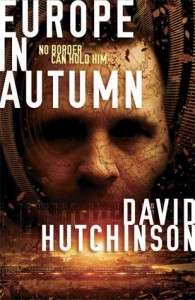Europe in Autumn
Dave Hutchinson
Solaris
Release Date: January 28, 2014
ISBN 978-1-78108-194-5
Shortlisted for the Arthur C. Clarke Award and a finalist for the John W. Campbell Memorial Award, Europe in Autumn is a sharp, zig-zagging espionage thriller set in an alternate near-future where economic instabilities have splintered Europe into a myriad of tiny nations – some echoing the countries we know, some encompassing much smaller, more factionalized areas, sometimes even a single urban compound or tourist park. Each are consumed by their own intensity of nationalistic fervor; each meticulously capitalize on strict border protocols that in many instances bring a huge chunk of income to the fledgling sovereign states, duchies, polities, principalities and republics.
But in the beginning (and at the heart) of the story, there is Rudi. Rudi, an Estonian, the head chef at the good but not great Restauracja Max in Kraków, Poland. He had wandered across the Baltic states, working at various establishments, before settling at Restauracja Max; someday he hopes to open his own restaurant and become his own boss.
That’s before the Hungarians came.
The Hungarians – “eight large men with gorgeously-tailored suits and hand-stitched Italian shoes and hundred-zloty haircuts” – manhandle their way into the restaurant without a reservation and piggishly proceed to act like they own the place. The restaurant’s actual owner, Max, indulges the hooligans despite having a deal with Wesoly Ptak, a protection racket. Max’s cool head keeps the incident from turning into a bloodbath, but it also has the consequence of casting doubt on Wesoly Ptak’s effectiveness – something the gang does not take lightly.
A few days later, Dariusz, the Wesoly Ptak representative, visits Restauracja Max to have a late dinner with Max just before closing time. Over steak tartare and a bottle of Wyborowa, Rudi is drawn into the conversation, and the talk eventually turns to geopolitics. Dariusz remarks on how well Rudi, an Estonian, speaks Polish. Max complains how it is nearly impossible for him to visit his cousin in neighboring Hindenberg because of his Polish passport, an impediment to obtaining a recognized visa due to bristling nationalistic rivalries. The men lament the unreliability of the mail between the two countries; even telephone calls are subject to Polish government policies. Both Dariusz and Max opine at how strange it is that neither one of them could cross the Polish border into Hindenberg, but that an Estonian could “practically walk across the border unmolested.”
Rudi divines the “favor” being asked of him: to keep Restauracja Max in Wesoly Ptak’s good graces, he agrees to a short trip to Breslau in Hindenberg, officially as part of a holiday excursion but in reality to receive clandestine information for Dariusz. Rudi doesn’t have an overarching sense of obligation to Max, but what the hell, it’s a break in the routine and doesn’t sound overly difficult or dangerous. So he makes the trip, amused by how clichéd it plays out with anonymous meetings on street corners and coded phrases between strangers.
The mission is a success and Rudi returns to his position at the restaurant, thinking that the short stint at espionage is behind him -but then Dariusz offers Rudi the chance to join the ranks of Les Coureurs des Bois. Originally the Coureurs had delivered the mail – items that were too precious or too sensitive to be trusted to various dubious postal systems. But over time they developed into a highly organized and far reaching cadre of smugglers. To make his dreams of owning his own restaurant more of a reality, Rudi agrees to join the Coureurs, but as he progresses deeper into the organization his missions become more covert – and more dangerous.
Eventually, Rudi starts to suspect that the Coureurs may not be as straightforward as he has been led to believe and he begins to see the hint of some larger conspiracy at play. When a mission to smuggle someone out of Berlin turns into something far more gruesome, Rudi finds himself caught up in a mystery where nothing is as it seems, and few are to be trusted. Now he must decide whether to continue to have faith in Les Coureurs des Bois, or take matters into his own hands to discover what lies at the root of all the secrecy and lies.
As a literary work, there are three things that allow Europe in Autumn to stand out from other cloak and dagger spy novels. The first is the sense of place that permeates the story – or rather, the sense of places. That the book is set in a different iteration of our world is a distinct advantage. Although it is genre’ed as “science fiction”, much of the action is set in what we think of as recognizable Slavic locations, but pared down to microcosms of what we understand of Eastern Europe. The geopolitic map is constantly in flux: “You go to bed in Wroclaw and wake up in Breslau,” Dariusz laments. The railway that bisects the continent is its own country, in itself a winding border that stretches scant meters beyond the train tracks and yet is surrounded by a myriad of other borders reinforced by red tape, and defended by border police, intelligence operatives and counterintelligence units. The people universally are both resigned and rabidly nationalistic. Special interests carve out their own territories and make high demands for entry and safe passage. There is little bureaucratic cohesiveness and yet strong familial and historical ties to what used to be unified countries, adding tension to what is now at best suspect neighbors and at worst, belligerent rivals.
The second thing that sets Europe in Autumn apart is the surprising plunge into another layer of reality that unfolds towards the last part of the book. The alternate world that author Dave Hutchison builds from the onset of Europe in Autumn becomes incredibly tangible as the story progresses, so that the deft turn in a different direction is truly exciting. In other novels, adding major plot points in the second half of the story tends to feel like baggage, as though more has to be injected into the action to keep it fresh or merely to ratchet up the suspense. In Europe in Autumn, the new development both explains mysteries of which one is barely aware while laying open new fissures in the action. It’s like solving an intricate puzzle only to have the final piece unlock a new, hidden cipher.
But the most engaging thing about Europe in Autumn is Rudi himself. We like him. There is no artifice to the character; he is not suave or savvy or tragic or conflicted. He’s real and recognizable, of whom author Hutchison said in a 2014 interview, “He’s cynical, capable, and fallible, he spends much of the book without the slightest idea what’s going on, but he never gives up; he just keeps plodding along, winging it. A lot like everyone, really.” He’s the type of guy who, when Dariusz talks to him about his initial mission, asking if he’d like “to do that kind of thing for a living,” he responds with, “I’m a chef. For a living.” And we believe him, because we have seen what he has endured to find as chef at Restauracja Max in the first place – in and of itself a compelling story. We see the passion that drives him, and it’s a passion that he never really loses sight of even as it is pushed further away: not fame, not fortune, but to be a chef. For a living.
Will Rudi ever realize his passion? Will he navigate through the ever shifting wormhole of espionage and undercover operations to find himself where he wants to be? Or will he get caught up in the lies and deceptions and maneuverings to the point where he can’t find his way back again? Or maybe, just maybe, will his world change to the point where passions shift and life fixates elsewhere? You’ll have to pick up a copy of Europe in Autumn and find out for yourself – and believe me, you’ll be glad you did.

